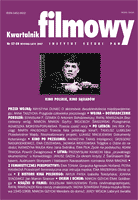Dezerterzy, święci, tyrani i "kreciki". Obraz ojca w polskim i czeskim kinie postkomunistycznym
Deserters, Saints, Tyrants and 'Little Moles': Image of Father in Polish and Czech Post-Communist Cinema
Author(s): Ewa MazierskaSubject(s): Theatre, Dance, Performing Arts
Published by: Instytut Sztuki Polskiej Akademii Nauk
Keywords: Polish Cinema; Czech Cinema
Summary/Abstract: The fall of communism had an enormous impact on the situation of men and women in the countries of the former socialist bloc, and on the social perception of the functions of the sexes. Post-communism tends to be associated with promoting and putting in practice of a society in which women and men play traditional gender roles. This tendency is usually identified with the growth of masculinism in Eastern and Central Europe. But the return to tradition had no explicitly positive influence on men. Patriarchalism requires men to take over part of the burden – which under communist ideology – men and women were supposed to share. At the same time, after 1989 men, no less than women, felt the negative effects of economic transformation (unemployment, uncertain employment and economically-motivated emigration). As a consequence, “post-communist man” finds it difficult to fulfil the traditional roles of the head of the family, husband and father. In addition, some males rejected fatherhood as they claimed it was in conflict with their choice of the lifestyle of the “single”. Mazierska wonders how the image of father in Polish and Czech cinema reflects these changes in the culture and society of the nations. I am also interested in the cinematic re-evaluation of fathers from the past as this is also affected by a modern concept of the family.
Journal: Kwartalnik Filmowy
- Issue Year: 2007
- Issue No: 57-58
- Page Range: 300-313
- Page Count: 14
- Language: Polish

